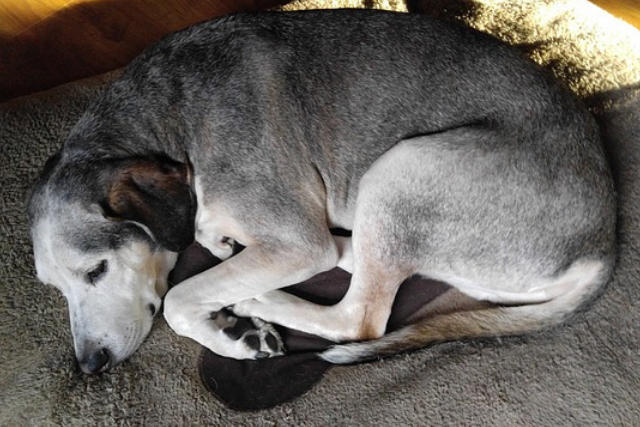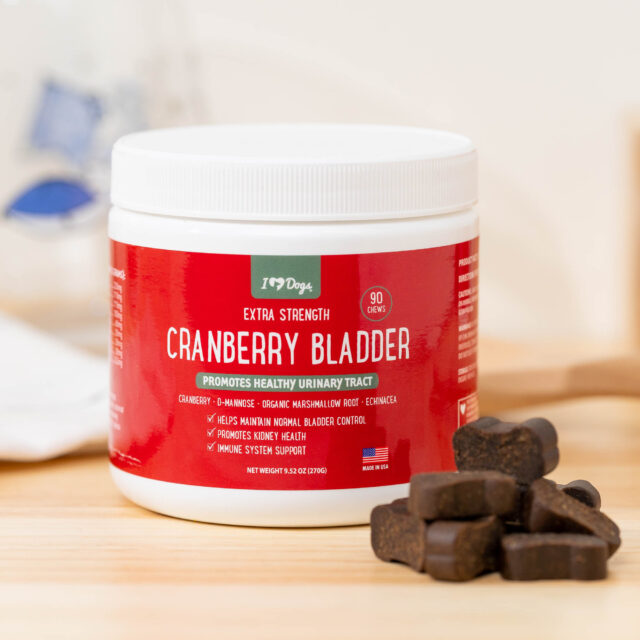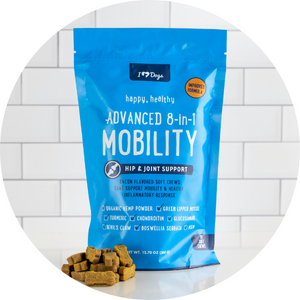Cleaning up messes is an unavoidable part of pup parenting, but peeing the bed is something more often related to human children than fur babies. You can’t send your dog to bed with a pair of pull-ups and waiting for them to grow out of it won’t work either. When a dog wets the bed, potty training is rarely the issue and can be linked to a potential infection or medical condition like Spinal Cord Disease or Diabetes.

When They’re Asleep
For kids, wetting the bed at night is a normal part of growing up. Most kids grow out of it before their age hits the double digits, but that’s not the case for your dog. If you find your dog’s bed wet with urine after he wakes up, his young age likely has nothing do with it. Your first thought shouldn’t be about better potty training, it should be concern for his health.
Related: 12 Best Dog Beds
Hormone Responsive Urinary Incontinence
Hormone responsive urinary incontinence is a condition most often affecting middle-aged, spayed female dogs and occasionally seen in younger females and males. According to Dogster, the issue has to do with a dog’s estrogen levels. When a female dog is spayed, her ovaries are removed. This leads to an automatic decrease in estrogen production. Reports indicate estrogen contributes to the control of a dog’s urethral sphincter (the muscle that allows a dog to “hold it”).
With less estrogen, the sphincter becomes more relaxed. Dogs experiencing hormone responsive urinary incontinence leak urine when they’re not consciously thinking about holding their bladder. As the dog ages and her sphincter naturally becomes weaker, the problem becomes more prominent. The condition is treatable, but it’ll require a visit to your vet.
Our partners at Lemonade pet insurance are here to assist. Lemonade offers industry leading preventive care packages designed to keep your pet healthy and helps cover expenses you’re already paying for.

Urinary Tract Infection
As with humans, urinary tract infections are common in dogs. It happens when bacteria invades the urinary tract and causes symptoms like painful urination, blood in the urine, and decreased bladder control. A UTI is often the reason a dog pees the bed.
A dog suffering with a UTI doesn’t “forget” their house training like their owner thinks. The infection in their urinary tract makes it difficult to stop the flow of urine when they really need to go. It can also make them feel like their bladder is full to bursting when it actually isn’t. This means they’ll need more frequent bathroom breaks, and they might not get out of bed fast enough. A round of antibiotics should clear up the infection and fix the problem.
If your dog frequently suffers from UTIs or bladder control, we’d recommend a good supplement that can help prevent the issue before it occurs. Our favorite supplement is the Extra-Strength Cranberry + D-Mannose supplement by iHeartDogs. There are also dozens of highly rated bladder control supplements on Chewy or Amazon.
Related: The 9 Best Beds for Senior Dogs
Other Medical Issues
There are several medical conditions that can affect a dog’s bladder control while they’re asleep. Possibilities include bladder stones, spinal cord injury, diabetes, and cognitive disorders. General incontinence, or the natural weakening of the urethral sphincter, also becomes more common as dogs age.
For many urinary-related medical issues, the problems are progressive. A dog might slowly leak small amounts of urine for several nights before you realize what’s happening. After a few weeks, there’s potential for that small leak to get worse. Eventually, the dog might empty his entire bladder without waking up. Finding your dog’s bed wet with urine after they wake up is always a reason to visit a vet.
Lemonade is one of the most loved insurance companies in America, and our pet insurance plans are no different. Lemonade pet insurance is receiving rave reviews from our customers, partners, and leading sources.
- Trustpilot: Ranked great with 4.2 out of 5 stars from real customer reviews
- Consumer Affairs: Ranked 4.8 out of 5 stars from real customer reviews
- Pet Insurance Review: Ranked 9.8 out of 10 from real customer reviews

When They’re Awake
Peeing on the bed when they’re awake poses different problems than when a dog pees the bed when they’re sound asleep. The medical issues listed above could still be to blame, but dogs generally do everything they can to avoid soiling their sleeping areas. It stems from a wild dog’s instinct to keep their den clean and sanitary. If something is overriding that instinct, it could be either medical, emotional, or behavioral.
Stress, Fear, and Anxiety
When your dog is frightened by thunder, worried about an unknown house guest, or feeling anxious for any reason at all, their bed is a place of comfort and safety. That type of emotional distress can cause a dog to temporarily lose control of their bladder or behave in ways they normally wouldn’t. If they’re afraid of a person or another animal in the house, there’s also the chance they’ll pee on their bed because they’re too scared to leave and go to their normal potty spot.
Indoor accidents are also associated with separation anxiety. Pet Carrier says,
“Dogs that have this issue tend to grow extremely distressed when left alone in the house, and one of the symptoms is urinating and defecating indoors. If your dog pees on your bed every time you leave them home alone, speak to a vet about separation anxiety. The chances are, your dog is leaving you a message in a place that they know without a doubt that you’ll find it.”
The only way to stop the bed wetting is to address the underlying emotional issue. Observe what happens before your dog pees on their bed, and consider that context to determine if its affecting your dog’s urination.

Related: The 10 Best Anti-Anxiety Dog Beds
Marking
Urine marking is something both male and female dogs do out of instinct. They mark trees and fire hydrants along their daily walks to tell other dogs they’re claiming that territory. Some dogs also mark around the house to warn off potential intruders.
If your dog’s confidence recently took a hit or he’s feeling threatened, he might start marking inside. You’ll know he’s marking and not breaking his housebreaking rules when he only lets out small amounts of urine in strategic places. Most dogs prefer to keep their beds clean, but an insecure pet trying to protect their belongings might go to extreme measures to keep others away from what’s theirs. This is most common when a new family member (human, canine, or feline) is introduced to the house. Helping your dog feel more confident and using positive reinforcement to show them where it’s appropriate to pee and where it isn’t will help.
Figuring out why your dog pees the bed is the first step in preventing it from happening. It’s important to remember that no matter how frustrating it is to wash your dog’s bed on a regular basis, punishment isn’t the answer. Whether their bedtime troubles are caused by a medical issue, stress, or the natural instinct to mark their territory, being angry will only add to their confusion. It’s always a good idea to talk to your vet for insight into your pet’s urinary health and tips for relieving stress and anxiety.
If your dog frequently suffers from UTIs or bladder control, consider researching a quality supplement such as this that can help prevent the UTI before it occurs. There are dozens of highly rated bladder control supplements on Chewy or Amazon.
Lemonade pet insurance is one of the most customizable plans on the market. Pet parents can choose from a variety of coverage amounts, preventative and care packages, and optional add-ons. You never pay for what you don’t need.
Get a quote today!







 Toledo, United States.
Toledo, United States.